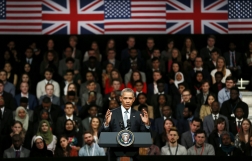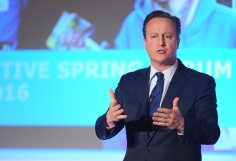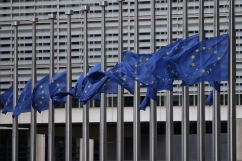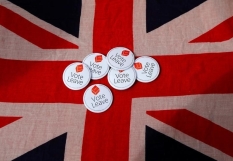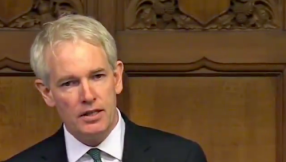When I was 13, my geography teacher gave our class a questionnaire asking: "Do you consider yourself: (A) English; (B) Scottish; (C) British; (D) European; or (E) Other?" I answered 'D' without any hesitation.
No-one else in my class gave this answer. When my teacher asked why, I explained that in our history class we had learned how nationalist ideologies had divided Europe into dangerous factions during the 1930s. Nationalism had led to the rise of Hitler and the Third Reich, culminating in the horrors of the Second World War and the Holocaust. Nationalism sowed seeds of fear and Europe reaped a harvest of hate.
Even at that young age I was frightened that history might repeat itself. I took comfort in the realisation that the European nations had learned the painful lessons of the 20th century and had discovered a new vision of integration and cooperation, embodied in the institutions of the European Union. Peace, freedom and democracy were assured.
I don't have this same assurance now.
In Russia a dangerous dictator with expansionist aspirations has emerged. Vladimir Putin has facilitated the emergence of a powerful and effective Trojan Horse of Eurosceptic, nationalist parties in the heart of the European Parliament.
Recently in Germany far-right parties, which support Putin and his efforts to erode European solidarity, have made major gains in the regional elections. Putin is building a parallel vision of Europe, scattered into isolated nationalistic factions that are too weak and divided among themselves to be able to resist his intentions to re-establish Russian dominance over Eastern Europe.
Popular sentiment in Britain, driven by a powerful tabloid press, seems to be riding on the crest of a populist wave of anti-EU sentiment. If Britain were to leave the EU there would be much rejoicing in the Kremlin and in the offices of extremist parties throughout Europe. But Brexit could easily trigger a series of unforeseen consequences that could result in the collapse of the entire European Union. Such a collapse could happen just as rapidly and unexpectedly as the implosion of the Soviet Union in the early 1990s.
Let's cast our minds back to the situation in Europe in May 1945. After the genocide carnage inflicted on Europe by Germany, the political reconciliation that was achieved was nothing short of miraculous. It was made possible by men and women acting out of Christian conviction, who were inspired by a vision of a united Europe as a beacon of hope and unity in a continent that had been torn apart by centuries of war.
The European Union, from its foundation to the present day, is the most powerful antidote against the degenerative and inhuman forces of nationalism and xenophobia that the world has ever seen. Governments of EU countries that have attempted to stoke populist nationalistic sentiment in order to restrict democratic rights and civil liberties have been kept in check by the European Union. The EU has become a bulwark of democracy and freedom and a space of civility, decency and courtesy throughout the world.
The EU's Christian foundations
Although outwardly secular, the institutions of the EU are embedded in Christian values of solidarity, tolerance, respect, compassion and freedom. Many people, including Christians, do not realise that the original founders of the EU were Christians who were inspired by a vision of reconciled nations.
One of these key founders was a Christian – the Foreign Secretary of France, Robert Schuman. In 1950, Schuman issued a declaration in which he stated: "We are called to bethink ourselves of the Christian basics of Europe by forming a democratic model of governance which through reconciliation develops into a community of peoples in freedom, equality, solidarity and peace and which is deeply rooted in Christian basic values." This Schuman Declaration, which set out a vision of all the European nations living in peace and mutual solidarity, laid the foundations of what was to become the European Union.
The movement for reconciliation and solidarity led to something that had never happened before in history: the 27 nations of Europe lived together in peace.
This kind of positive vision that underlies the European Union is often clouded by the tabloid caricatures of a monstrous bureaucratic system that 'interferes' in the lives of British people. The result of such distortions is that the quiet work of the EU in facilitating social and cultural renewal as well as religious understanding goes unnoticed. Through my work and studies in Germany and the Netherlands and my involvement in the Erasmus Programme and the Ecumenical Youth Council of Europe, I have had an opportunity to see close up the work that the European Union does behind the scenes. I have seen for myself how the EU offers a framework of inter-state solidarity in which Europeans are not united by the cult of a flag or a nostalgic fetish for a utopian past. Europeans are bound together not by nationalism but by a shared commitment to the rule of law, which guarantees freedom and universal human rights.
Another regrettable feature of the current debate is the total domination of economic factors when in fact the most critical arguments revolve around values and traditions. European civilisation – although far from perfect – also denotes a cultural identity that has deep roots in the Christian tradition.
Have we forgotten the immense contribution that the European Union has made after the Second World War towards securing peace, reconciliation and even prosperity among the diverse nations of the continent? If Britain leaves the EU, it could trigger a domino effect. In next year's elections, the National Front's Marine Le Pen (another admirer of Putin, who refers to Le Pen as Europe's "greatest politician") could become President of France. Le Pen, whose party has been funded by Russian banks linked to Vladimir Putin, is running on a far-right agenda that campaigns for France's exit from the EU.
A Brexit would add great momentum to Le Pen's campaign and may lead to other countries withdrawing from the EU. Anti-EU sentiment is growing in Hungary, where the President, Viktor Orban, may be emboldened to make good his intention to leave the EU and seek an alliance with the Kremlin. The Czech Republic, which has a similarly pro-Putin president, would probably follow suit. This would trigger a constitutional crisis that would lead to the break-up of Europe into nationalistic enclaves, each doing what is right in its own eyes. Europe will again be teetering on the brink of a precipice of war and nationalistic hatred.
The EU is currently under a concerted attack by an unholy alliance of communists, hardline demagogues and neo-Nazi parties. Right-wing political parties and associations such as PEGIDA in Germany, UKIP in England, the National Front in France, and Geert Wilder's neo-fascist, Islamophobic Party for Freedom in the Netherlands are on the rise. In Slovakia the ultra-nationalist fascist Marian Kotleba refers to foreigners and refugees as "parasites". Kotleba, who despises the EU, has recently won a significant regional election in Slovakia. He was head of a banned neo-Nazi party which allegedly celebrates Adolf Hitler's birthday and looks back nostalgically on the Nazi puppet state that ruled Slovakia during World War II.
I'm now afraid that these extremists are winning and that those of us who believe in solidarity, peace and reconciliation among the nations are going to lose. We are about to enter a new age in which nationalism triumphs over solidarity.
We might think that we are now living in a civilised world and that we can take peace for granted, but this would be a huge mistake. The EU does not get the credit it deserves for preserving peace among nations that for centuries before had been cutting each others' throats.
I do not believe that the EU is free from the seduction of anti-Christian forces. But in the light of its role in facilitating peace and reconciliation in Europe, I would tentatively argue the EU was established in the providence of the "God of peace" in order to promote peace, security and the general welfare of the world. The EU offers a model of international solidarity and a bulwark against xenophobia, nationalism, fascism and racism.
Coalition of dark forces
This is a view which is informed by sustained prayer and reflection on the broader trends in Britain and Europe today. So I must state plainly that I believe the current efforts to destroy the European Union are ultimately inspired by the kinds of "principalities and powers" to which the author of Ephesians alluded. A coalition of dark forces, incarnated in xenophobic, nationalistic and neo-Communist and neo-Nazi parties, has recognised an opportunity to destroy the EU institutions of civility, democracy and solidarity, which have preserved peace and freedom in Europe for more than 70 years.
Scripture teaches that Satan, the enemy of God and humanity, prowls around like a roaring lion (1 Peter 5:8) looking for opportunities to mar and deface God's good creation by sowing the seeds of mistrust, fear and hatred among peoples and nations. These seeds came to a devastating bloom during previous eras of European history, in particular during the Thirty Years' War (1618-48), the Napoleonic Wars (1803-15) and the two European wars of the 20th century (1914-18 and 1939-45). The powers and principalities were unleased in all their destructive fury in the 1930s, when most European nations were governed by political extremists on the right and left.
These forces demolished the trans-national structures, such as the League of Nations, that were in place to ensure the future of a free and democratic world. In the 1930s in Europe, small-mindedness, stupidity, ignorance and apathy triumphed over tolerance, wisdom, enlightenment and solidarity.
I believe that Satan now has seen an opportunity in this uncertainty over the future of the EU once again to sow his seeds of nationalism and xenophobia on the continent of Europe. I am not in any way suggesting that the leaders of the Brexit campaign are demon-possessed or that they are campaigning for a cause they know to be evil – nor, for that matter, would I ever claim that those who defend the EU are angels of light. Likewise, I am not claiming that the EU is inherently good. I regard the EU itself as neither benign or malign, but as having a role ordained in God's economy to promote good and deter evil.
Nor do I question the integrity of most of the Brexit campaigners. I respect their motives. However, I feel compelled to warn of the catastrophic long-term consequences that could result from a British withdrawal from the European Union.
The problem is that the Leave campaign has a clear strategy of accusing anyone who warns of the dangers of leaving the EU as engaging in "scaremongering". In the 1930s there were people in Britain who accused the likes of Winston Churchill of scaremongering when he issued dire warnings about the rise of Hitler and its implications for world peace.
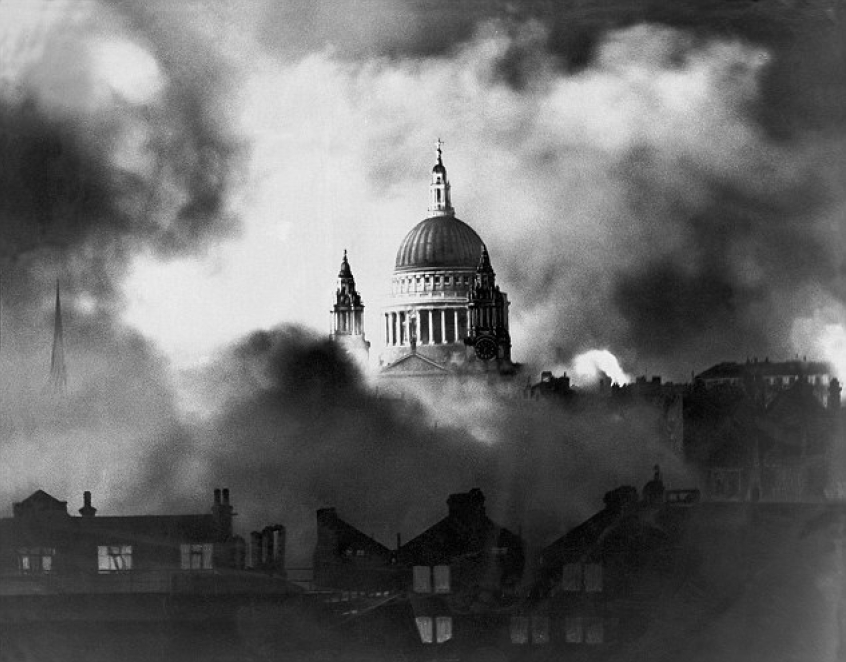
After all, the appeasers said: "Hitler isn't so bad. He just wants to restore German national pride and, like us, he hates communism. And who cares about Czechoslovakia anyway?"
So I do feel a Christian obligation to warn of the dire consequences that would ensue from a Brexit. Sir Edward Grey said almost exactly 100 years ago: "The lamps are going out all over Europe and we shall not see them lit again in our life-time." I'm afraid there is now a risk that we are about to enter another period of prolonged political and spiritual darkness in Europe.
There is a real danger that politicians are not spiritually equipped to grasp the cultural or geo-political consequences of withdrawing from the EU. Many Christians, too, do not have a proper understanding of the tectonic spiritual shifts that are taking place in the world.
I hope readers will at least consider carefully the case I've tried to make about why, from a Christian perspective, it is essential that solidarity and hope prevail over nationalism and fear.
Dr Joshua Searle is tutor in Theology and Public Thought at Spurgeon's College.











